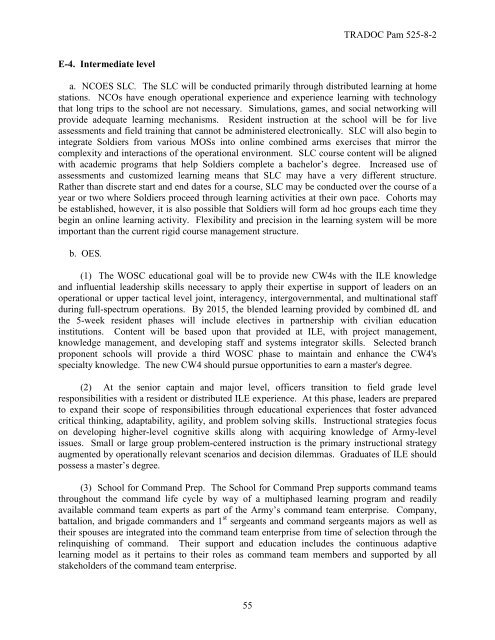K3zgZ
K3zgZ
K3zgZ
Create successful ePaper yourself
Turn your PDF publications into a flip-book with our unique Google optimized e-Paper software.
TRADOC Pam 525-8-2<br />
E-4. Intermediate level<br />
a. NCOES SLC. The SLC will be conducted primarily through distributed learning at home<br />
stations. NCOs have enough operational experience and experience learning with technology<br />
that long trips to the school are not necessary. Simulations, games, and social networking will<br />
provide adequate learning mechanisms. Resident instruction at the school will be for live<br />
assessments and field training that cannot be administered electronically. SLC will also begin to<br />
integrate Soldiers from various MOSs into online combined arms exercises that mirror the<br />
complexity and interactions of the operational environment. SLC course content will be aligned<br />
with academic programs that help Soldiers complete a bachelor’s degree. Increased use of<br />
assessments and customized learning means that SLC may have a very different structure.<br />
Rather than discrete start and end dates for a course, SLC may be conducted over the course of a<br />
year or two where Soldiers proceed through learning activities at their own pace. Cohorts may<br />
be established, however, it is also possible that Soldiers will form ad hoc groups each time they<br />
begin an online learning activity. Flexibility and precision in the learning system will be more<br />
important than the current rigid course management structure.<br />
b. OES.<br />
(1) The WOSC educational goal will be to provide new CW4s with the ILE knowledge<br />
and influential leadership skills necessary to apply their expertise in support of leaders on an<br />
operational or upper tactical level joint, interagency, intergovernmental, and multinational staff<br />
during full-spectrum operations. By 2015, the blended learning provided by combined dL and<br />
the 5-week resident phases will include electives in partnership with civilian education<br />
institutions. Content will be based upon that provided at ILE, with project management,<br />
knowledge management, and developing staff and systems integrator skills. Selected branch<br />
proponent schools will provide a third WOSC phase to maintain and enhance the CW4's<br />
specialty knowledge. The new CW4 should pursue opportunities to earn a master's degree.<br />
(2) At the senior captain and major level, officers transition to field grade level<br />
responsibilities with a resident or distributed ILE experience. At this phase, leaders are prepared<br />
to expand their scope of responsibilities through educational experiences that foster advanced<br />
critical thinking, adaptability, agility, and problem solving skills. Instructional strategies focus<br />
on developing higher-level cognitive skills along with acquiring knowledge of Army-level<br />
issues. Small or large group problem-centered instruction is the primary instructional strategy<br />
augmented by operationally relevant scenarios and decision dilemmas. Graduates of ILE should<br />
possess a master’s degree.<br />
(3) School for Command Prep. The School for Command Prep supports command teams<br />
throughout the command life cycle by way of a multiphased learning program and readily<br />
available command team experts as part of the Army’s command team enterprise. Company,<br />
battalion, and brigade commanders and 1 st sergeants and command sergeants majors as well as<br />
their spouses are integrated into the command team enterprise from time of selection through the<br />
relinquishing of command. Their support and education includes the continuous adaptive<br />
learning model as it pertains to their roles as command team members and supported by all<br />
stakeholders of the command team enterprise.<br />
55




